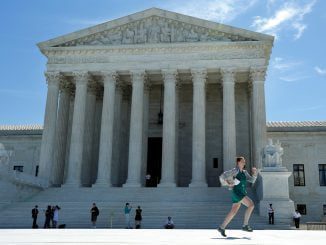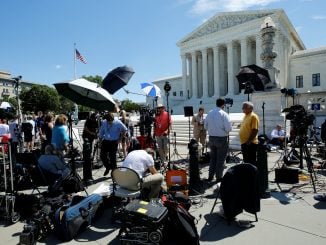WASHINGTON, D.C. — President Donald Trump has selected Amy Coney Barrett as his nominee to the U.S. Supreme Court to fill the vacancy created by the recent death of Justice Ruth Bader Ginsberg.
“Today it is my honor to nominate one of our nation’s most brilliant and gifted minds to the Supreme Court,” said President Trump. “She is a woman of unparalleled achievement, towering intellect, sterling credentials, and unyielding loyalty to the Constitution, Judge Amy Coney Barrett.”
“Thank you very much, Mr. President. I am deeply honored by the confidence you have placed in me,” said Barrett.
“I fully understand this is a momentous decision for a president,” said Barrett. ” And if the Senate does me the honor of confirming me, I pledge to discharge the responsibilities of this job to the very best of my ability.”
Barrett said she loves the United States and the United States Constitution and is “truly humbled by the prospect of serving on the Supreme Court.” She added that if confirmed, she will be mindful of who came before her. Barrett went on to acknowledge the passing of Justice Ginsberg, noting that she had “smashed glass ceilings” and referenced the friendship between Ginsberg and the late Justice Antonin Scalia.
Barrett has walked the halls of the Supreme Court in the past, serving as a law clerk from 1998 to 1999 for Justice Scalia. Prior to clerking for Scalia, she also clerked for Judge Laurence Silberman of the U.S. Court of Appeals for the D.C. Circuit.
If confirmed, Barret will be the fifth female to become a Supreme Court justice and she is being nominated on the same day Scalia took his oath to serve in 1986.
Barrett, who is 48 years old, was nominated by Trump to the U.S. Court of Appeals for the 7th Circuit in May of 2017. She was confirmed by the Senate that October along partisan lines by a vote of 55-43. The three Democrats who crossed the aisle to vote for her were Joe Donnelly of Indiana, Tim Kaine of Virginia, and Joe Manchin of West Virginia. During her time on the 7th Circuit, she’s written around 100 opinions, which include both dissents and concurrences. Barrett is the first woman to hold an Indiana seat on the 7th Circuit.
After less than a year on the 7th Circuit, Barrett was reportedly on Trump’s shortlist of nominees in 2018 to replace Justice Anthony Kennedy. Justice Brett Kavanaugh was chosen instead to fill the seat.
From 1992 through 2003, she practiced law at the firm of Miller, Cassidy, Larroca & Lewin in Washington, D.C. In 2002, Barret returned to her alma mater, University of Notre Dame Law School, to become a professor teaching courses in constitutional law, statutory interpretation. Before heading back to Notre Dame, she spent a year at George Washington University as a law and economics fellow.
Barrett grew up in Metairie, located in Jefferson Parrish of New Orleans, Louisiana. While living in the New Orleans area, she attended St. Mary’s Dominican High School, a Catholic girls’ school. She later went on to attend Rhodes College in Tennessee, where she graduated magna cum laude in 1994.
Known to be devoutly Catholic, Barrett found herself being grilled about her faith during her 2017 confirmation hearing for her seat on the 7th Circuit Court of Appeals. Democrats on the Senate Judiciary Committee took turns grilling her on whether her Catholic faith would impact potential rulings, particularly that of abortion and the death penalty.
Sen. Dick Durbin (D-IL) asked Barrett, “Do you consider yourself an orthodox Catholic?”
“If you’re asking whether I’m a faithful Catholic, I am, although I would stress that my own personal church affiliation or my religious belief would not bear on the discharge of my duties as a judge,” replied Barrett.
Sen. Dianne Feinstein’s (D-CA) back and forth with Barrett was seen by many as testing the limits of the Constitution’s Article VI which prohibits “religious tests” for holding government office.
“When you read your speeches, the conclusion one draws is that the dogma lives loudly within you,” Feinstein said to Barrett during the 2017 hearing. “And that’s of concern when you come to big issues that large numbers of people have fought for, for years in this country.”
“It is never appropriate for a judge to apply their personal convictions, whether it derives from faith or personal conviction,” Barrett said in response.
Barrett was consistent on judgeship impartiality in her written responses to questions from the Judiciary Committee, stating that “My role as an academic was to stand outside of the system and to provoke students of the law to think hard about how the system works. Sometimes that involves critiques of the system. A judge, by contrast, operates within the system, and her duty is to apply the law as it exists.”
The topics of religion and abortion are likely to come up again during the confirmation process, despite only two abortion-related cases in her three years on the 7th Circuit.
One case was a legal challenge to the constitutionality of a 2016 Indiana law signed by then-Gov. Mike Pence. The law banned abortion on the basis of characteristics such as disability, race and gender and also laid out requirements that fetal remains be cremated or buried. In that case, Barrett joined the dissent and favored a rehearing. The case went to the Supreme Court, which ruled in 2019 in favor of the fetal remains disposal provision but did not touch the 7th Circuit’s decision to strike down the characteristics ban.
A second case was an Indiana law that would have required doctors to notify the parents of a minor seeking an abortion. Barrett joined the dissenters who favored a rehearing.
Barrett is married to Jesse Barrett, who was a former federal prosecutor for 13 years and is a partner in a South Bend law firm. The couple has been married for over 18 years and they have seven children – two of them, Vivian and Jon Peter, are adopted from Haiti and their youngest child, Benjamin, has special needs. The family currently resides in South Bend, Indiana.



